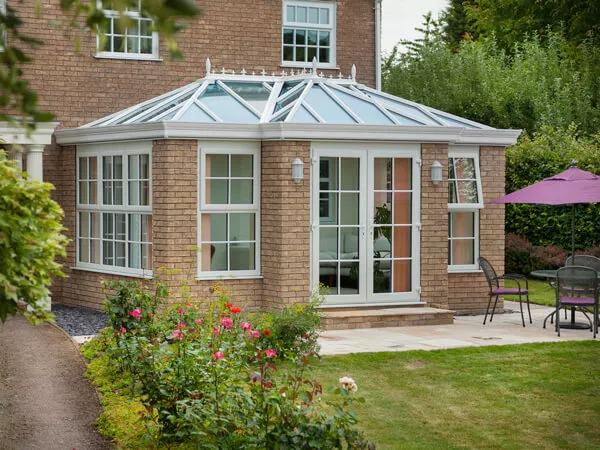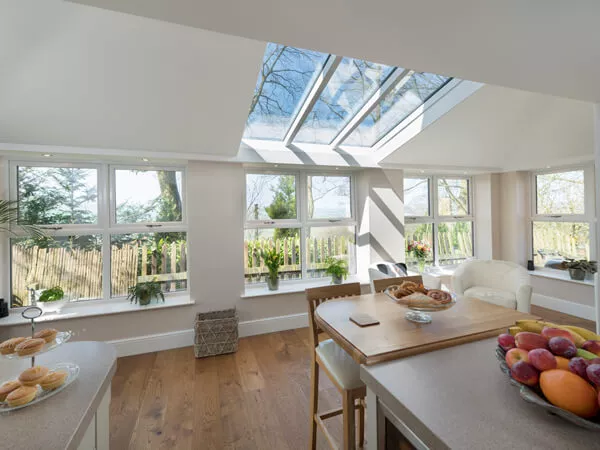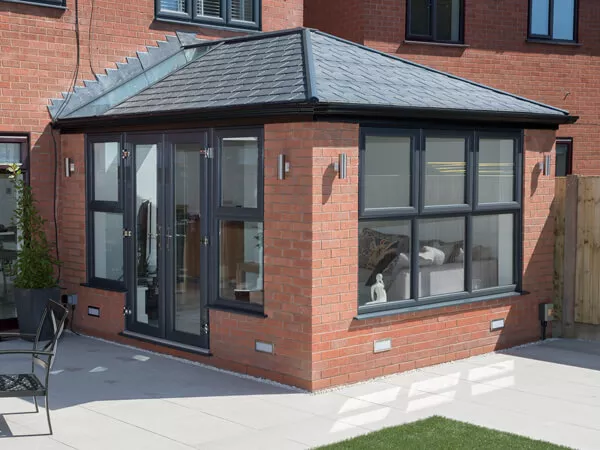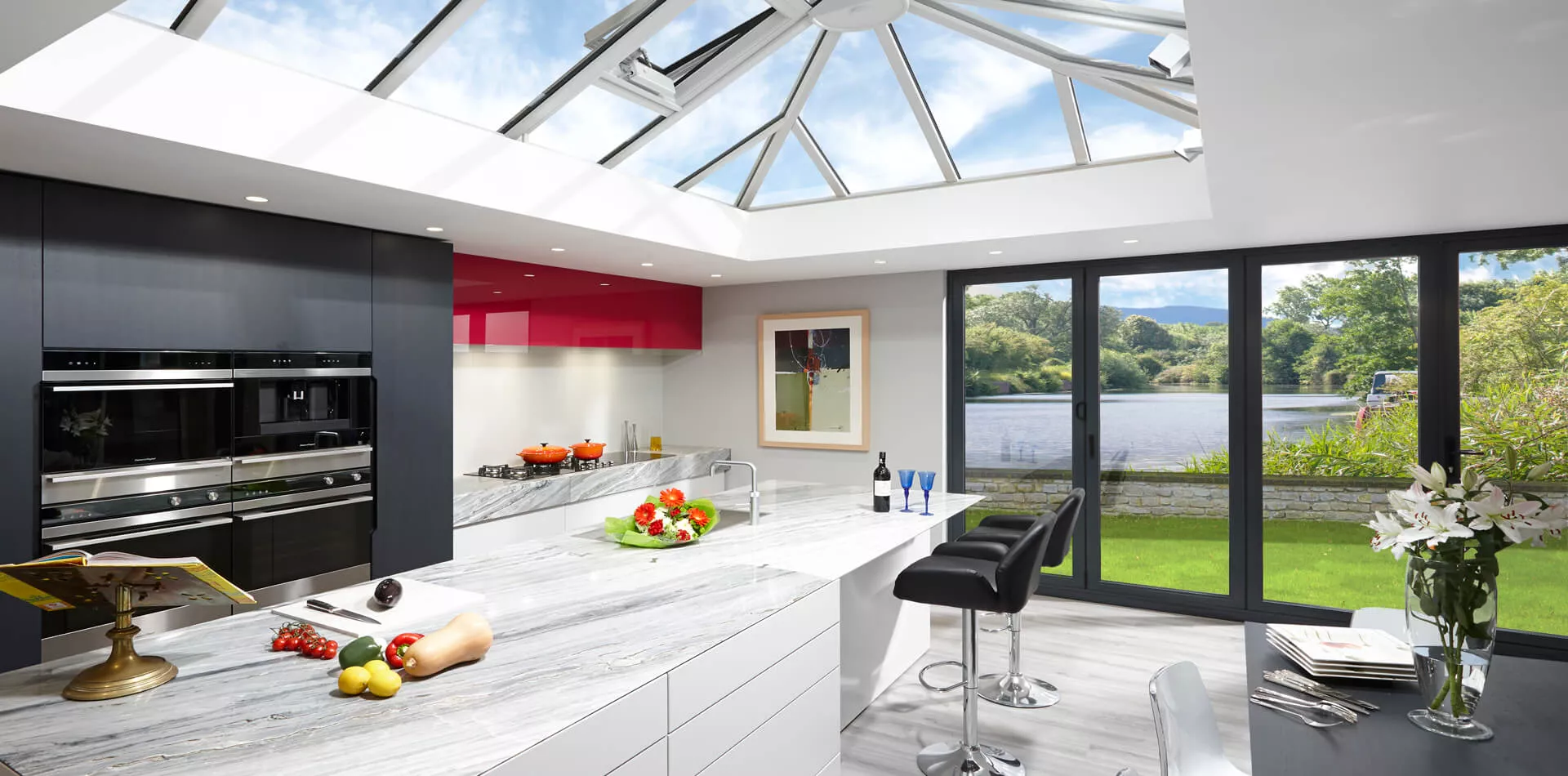What's the difference between a conservatory, orangery and an extension?
This is a very popular question and in all honesty, they can all be considered as living spaces due to how blurred the lines are between them nowadays. In the past, a conservatory would predominantly consist of glass, present in the roof and walls, giving you fabulous garden and aerial views. Fast-forward to now and you will notice that many conservatories have tiled roofing systems, which do a good job of providing insulation and internal warmth. To prevent overheating in a conservatory, you can always rely on solar control glazing.
An orangery is characterised by either brick or aluminium pillars, affording you the utmost in privacy and warmth, and offering a luxurious living destination. There’s also usually a pelmet around the roof’s perimeter which makes a big contribution to the thermal insulation the space offers. As for its roof, anything goes. You can have a glass lantern, solid tiled roof or crossover between the two.

If you want something that feels like a natural extension of your house, a home extension is probably the best option. A home extension has a very solid feel, plenty of brickwork and typically features a solid tiled roof. But you can have a hybrid roof, one that incorporates glass panels and / or Velux windows, great for bringing in light and ventilation. The useability of a home extension is a big selling-point as it delivers exceptional temperature control in all weathers.
At the end of the day, they’re all outstanding living spaces. Talk to an advisor to find out more about them all.

Do I opt for a tiled roof or a glass roof?
This decision all comes down to a series of factors, such as how you intend to use the space, which direction it needs to face, and how much money you have to spend. If you’re looking to have a bright-filled space, with a captivating garden view, the inclusion of solar control glazing will ensure that your tiled or glass roof doesn’t cause the space to overheat.
We highly recommend a solid tiled roof if you want an extension that you can use year-round, and complement it with full length glass panels or Velux windows. That’s when it becomes a hybrid roof, giving you a combination of the benefits of a solid and glass roof.
For a discussion about tiled and glass roofs, just reach out to a Mitchell Glass advisor.

MORE COMMON QUESTIONS
You can direct any questions that you have to an advisor. However, you may find an answer to your questions below, some of the questions we’re most commonly asked.
Will it be too hot in summer and too cool in winter?
We know that this is a major concern for many customers, so that’s why we prioritise year-round comfort when designing all of our living spaces. The old polycarbonate roofs, that used to turn conservatories into red-hot greenhouses, are long gone. Using solar control glazing eliminates any possibility of excess heat internally, but if you want to be doubly sure of a year-round extension, we suggest that you include a tiled roof in the design to fight off the weather.
Do you manufacture your own roofs?
We certainly do. Mitchell Glass is very proud to be a member of the Conservatory Outlet Group of companies, and Conservatory Outlet is a highly-respected manufacturing of roofing products. They manufacture them at their state-of-the-art manufacturing facility in Wakefield, West Yorkshire.
The tight bond we have with Conservatory Outlet helps us to retain close control over our supply chain, so we know that roof manufacturing standards are always consistently high.
Can I choose different roof tiles to match my home?
Of course you can. You’re able to select from a range of shingle and slate roof tiles, and you won’t have any issue finding a tiled solution that matches the roof tiles on your house. A number of flat roof membranes are also available. To discuss roof tiles in more detail, speak to a Mitchell Glass advisor.
I’ve heard about energy rated windows. What are ‘A’ rated windows?
As per the BFRC Rating Scheme, A rated windows are the most energy efficient windows you can get in the UK. All windows sold in the UK are labelled with an energy efficiency rating so that you can identify their thermal performance and also check whether the thermal efficiency they offer complies with current Building Regulations.
A bit like you find on ‘white’ goods e.g. fridges, freezers, washing machines, a traffic-light style energy rating system is used on windows, with them rated from A-E. Please, always look out for the energy rating of any set of windows to help you make a more informed buying decision.
What is solar control glazing?
There is an inventive coating on solar control glazing that helps prevent excessive heat from entering into a room and also stops internal heat from escaping. You can request tinted glass if you want to determine the level of light transmission and heat retention, and there are a series of tints available. Just talk to one of our advisors for guidance on solar control glazing.
Can I brick match my existing bricks?
We will make a concerted effort to find the closest possible brick match to help your living space match up nicely with your home. Please, be advised that there can be weathering and manufacturing differences between existing and new bricks. If we experience difficulty locating a suitable brick match, it can be tinted to solve that, but this will require an additional cost.
Will I need Building Regulations Approval?
To extend a property you generally need to obtain Building Regulations Approval, but there are certain classes of extensions that don’t require it. Mitchell Glass will clarify this. One of our surveyors will guide you through and inform you of the process, making it as stress-free as they possibly can. If Building Regulations is necessary, Mitchell Glass will approach your local authority to get this organised.
Will I need planning permission?
Extensions & Conservatories
You don’t require planning permission if the extension meets certain rules. This is called ‘permitted development’.
If your extension will have one storey, you don’t need planning permission as long as:
- it’s located at the back of the house
- it doesn’t go back further than 3 metres if it’s a terraced house, or 4 metres
- if it isn’t the height of the eaves (where the wall meets the roof) is no higher than 3 metres
- it’s not higher than 4 metres, including sloping roofs
- it doesn’t cover more floor area than your house does
- it doesn’t take up half the ‘curtilage’ – the grounds behind your home
- it isn’t within a conservation area
If you want to add a porch to a front door, back door or side door on your house,
different rules apply.
Porches
You won’t need planning permission to add a porch to a front door, back door or side door on your house as long as:
- its footprint (the total floor area it takes up) is no greater than 3 square metres
- there’s at least 2 metres between the edge of the porch and any boundary facing a road
- it isn’t taller than 3 metres
- it isn’t within a conservation area
What is the timescale for building my new living space?
It is hard to give you an exact estimate of how long it will take as it all depends on whether there are any planning requirements and how complex the project is. Ask for a copy of our ‘What happens next’ guide to gain an understanding of the building process.
What is a test dig?
We carry out a test dig to check that the ground is sufficient for a traditional concrete base and foundation, prior to performing any construction work. Upon the discovery of the ground being suitable, we will inform you of an alternative foundation proposal such as a specialist pile foundation or concrete raft.
Can you tell me what a cavity tray is?
A cavity tray is a series of high level damp proof courses that bridge a wall cavity to direct moisture to the external face of a wall where the extension roof joins the house wall. To put it more simply, it counteracts any moisture forming on the outer wall and becoming visible in the extension.
Do you offer finance to help me pay for for my new living space?
Yes. To make life easy for you, Mitchell Glass can arrange a variety of affordable and convenient easy payment finance options (subject to application & status). Applying for finance is simple and we promise you a quick decision. Everything can be sorted out with you in the comfort of your home or at your local Mitchell Glass Showroom, so you can enjoy whatever you’ve set your heart on right away.
What do we need to do when our finance is approved?
If you’re arranging your own finance, you’ll need to call us as soon as you get the go ahead. If you’re taking up one of our offers, the company will tell us both directly, so there’s no need to call as we will get in touch with you.
What happens if finance is refused?
Finance companies can turn down people for lots of reasons, for example if you’ve moved several times over the past few years. In these circumstances, we always do our best to help and sometimes it’s worth trying another provider, especially if they know you.
I’ve applied for finance with Mitchell Glass. How long will approval take?
Sometimes our finance company will say ‘yes’ almost immediately and on other occasions it may take them a few days. This short delay can be for any number of reasons and you should not be unduly concerned.
MITCHELL GLASS PROMISES
For all your home improvement needs, let Mitchell Glass take care of it with our Armchair Service.
Established in 1875
Mitchell Glass have an unrivalled history in serving the home improvement needs of our customers. We use all the experience gained in over 140 years of business to deliver the product of your dreams. We will spend time with you when making those important decisions.
Our Promise To You
Giving our customers complete confidence in the price that they pay is very important to us. Find the same quality product and service commitment for less (within our service area) before you place an order with us and we will price match it.
FENSA REGISTERED
Mitchell Glass is proud to be a member of FENSA (Registered No. 22655) - the leading body providing homeowner protection in the double glazing industry for windows and doors.
BESPOKE SERVICES
Our range of services includes development of bespoke design ideas, building plans, planning permission and building regulation applications, for your home improvement project.
OUR FINANCE CALCULATOR
See how affordable your home improvement can be with our Finance Calculator.
NEED MORE ANSWERS?
Simply fill in your details below and one of our customer advisors will get in touch to answer any of your questions.



